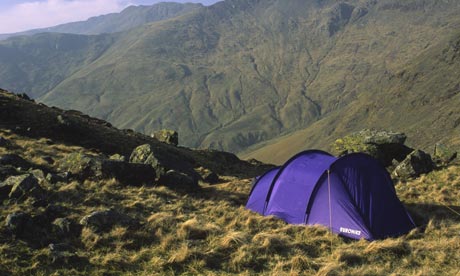
Wild camping – out on the hills, away from organised campsites – is technically illegal almost everywhere in England, unless you have special permission. And so I would like to deny in the strongest possible terms any suggestion that last week, in the company of a friend, I set out from the village of Buttermere, in the Lake District, on to the surrounding peaks for a first-time experience of British camping's edgiest subculture. Please take what follows, therefore, in the spirit of OJ Simpson's controversial "hypothetical" memoir If I Did It: Confessions of the Killer, except without the bit about the horrific double murder.
Regular camping, as everyone knows, suffers from a fundamental contradiction: the urge to escape into rural tranquility tends to bring you, instead, a few unsoundproofed metres from noisy families, revving car engines, and smelly toilet blocks. Wild camping (illegal in England and Wales except for parts of Dartmoor, but broadly legal in Scotland) offers the solution. There's something magical about taking the first hints of a summer dusk not as your cue to head down from the mountains, but deeper into them, in search of a sheltered, out-of-sight pitch. Being woken in the night by gusting wind or rustling animals is vastly less annoying than being woken by humans. And rising to watch the fog clear the nearby summits, over a stove-cooked breakfast of sausage, egg and beans, is an irresistible salve for the soul.
There's one big downside, though, and it's not the one about bodily functions. (Take a lightweight trowel, experts recommend – though we cheated by picking a route that took us via the youth hostel at Honister Hause.) It's that you have to carry the tent. And a sleeping-bag, preferably with a self-inflating mattress. And cooking equipment. And food and water. It all seems heavier by the hour, even when you've eaten the food; ultra-lightweight gear is available, but the lighter it gets, the more you pay. You'll sweat, and at best you'll have some freezing Lakeland tarn to freshen up in. At the end of a couple of days, though, you'll feel more deeply, nourishingly exhausted than would ever be possible with a trip to a campsite. Or at least I'm guessing you will. As I say, this is all hypothetical.

